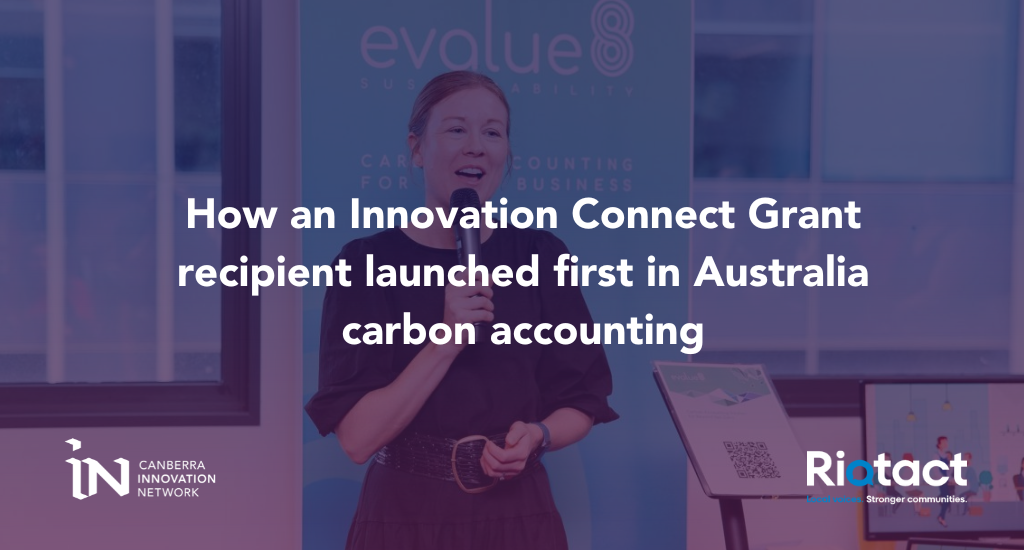- 5 May 2023
- Posted by: Ben Garrett
- Categories: Feature, General News, Innovation Connect Grant, KILN Incubator

In 2005, Ilea Buffier acted on a long-standing desire to make her business, Ninetofive Interiors, carbon neutral.
She spent three months on data collection, pulling out invoices and hiring expensive consultants to help create overwhelmingly complicated documents.
“I was committed to reducing our footprint but after all the time, money and energy that went into that process, there were no resources left for implementation,” she says.
“When I did do it, it was piecemeal. We switched to electricity, changed light bulbs, we even switched to EVs, but we couldn’t track the outcomes of all that.
“So many things changed in that time – the business had gotten bigger and there were too many variables to actually confirm that the initiatives we were undertaking were having the desired effect.”
She doubted she was the only business owner struggling with the administrative burden of addressing their footprint.
Ideally, there would be carbon accounting software that could link to a business’s regular accounting software, pulling data the company already needed as part of its business-as-usual accounting and combining that with established average carbon emissions for all business activities.
Such a solution could produce a dashboard of the company’s emissions and keep it as up to date as its accounting and survey information, with minimal onboarding and data entry required.
In 2006 she became an angel investor in a company called Carbon Planet, but when the company went bust following the repeal of the carbon pricing scheme, she purchased the software from the administrator and took matters into her own hands.
She was primed, because in that time, she had been attending Canberra Innovation Network (CBRIN) courses on everything from bringing ideas to fruition to building a business plan, lean methodology and negotiating term sheets.
She learned how to put her “plan on a page”, objectively validate her unique value proposition and understand where her customers would come from.
“That was crucial because I became familiar with what the start-up journey really was,” she says.
“It taught me critical analysis and to question whether customers were actually going to buy my product.
“I learned that if you’re too protective of your idea, you risk not incorporating critical customer feedback into your design. It has to be a constant circle of iteration until you have something of value to the market.”
Around that time Ilea was made aware of the Innovation Connect (ICON) Grant that the Canberra Innovation Network administers on behalf of the ACT Government.
An ACT Government grant facilitated by the Canberra Innovation Network, the ICON Grant is an early stage match funding grant to support the market testing, prototyping, patenting and commercial feasibility of recipients’ concepts.
Ilea applied for and received $30,000 in funding, which went towards prototyping, setting up and validating the original business structure for her new business.
In 2020, Evalue8 Sustainability went live. Version two launched in 2021.
Since then, it has gained steady uptake, recently signing up its first few international clients. And it’s about to expand to another 160 countries.
The first carbon accounting application in Australia to connect with Xero – the accounting platform almost 50 per cent of businesses use in the country – Evalue8 Sustainability calculates and maps a business’s carbon flow based on averages for the relevant region, location and time the carbon was generated.
The software identifies potential areas for energy savings and the impacts of any action taken.
“Carbon accounting has been relatively inaccessible, especially to smaller businesses,” she says.
“An automated system is much better than setting a target for a year and hoping you get there before your needs change. Because while hope is wonderful, it isn’t a strategy.”
Coming full circle, Ilea will be on the independent assessment panel for the next round of ICON Grant recipients, which will be announced in June.
She says with high demand for innovation, particularly in technology, the grant is a worthwhile process – but it’s “not all easy street”.
“You have to be able to describe your idea succinctly and know your key value proposition,” she advises.
“It is a fantastic resource to have that early-stage support for business, however money should never be your driving objective as an innovator.
“It should be the purpose and impact of your idea – those are the criteria that set applicants apart. That’s what investors are looking for because it can be a tough journey and capital alone won’t get you through.”
To learn about the Innovation Connect Grant, book an introductory meeting with one of the Canberra Innovation Network team members today.
Article written by Dione David from Riotact.

